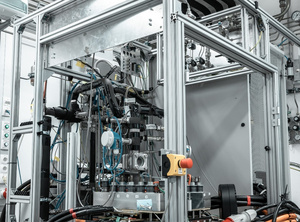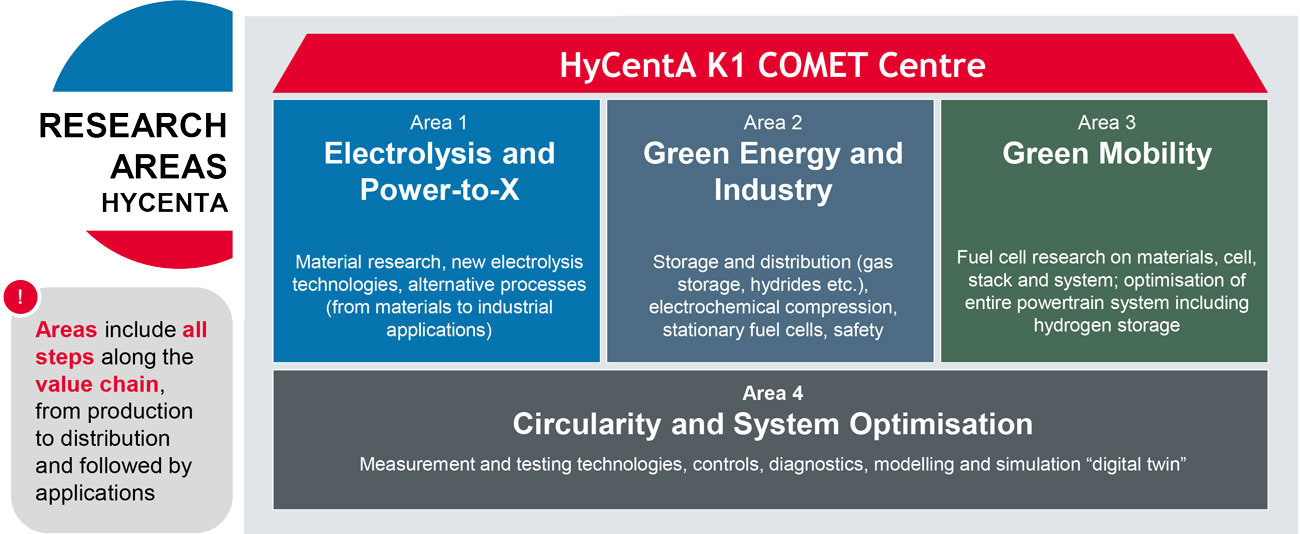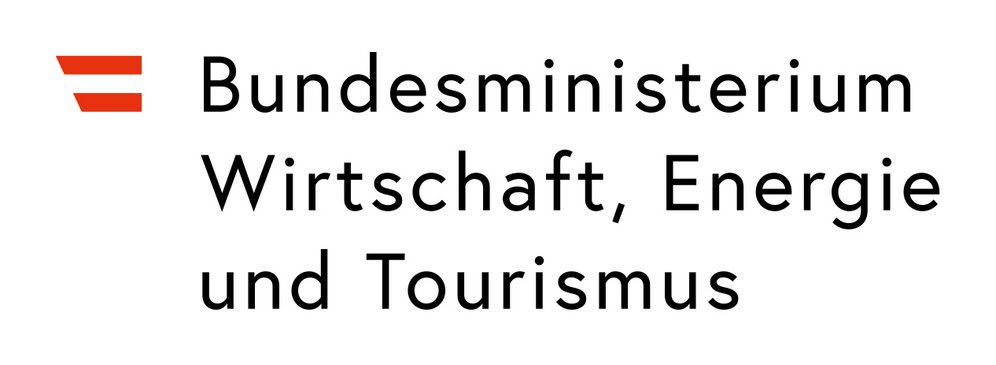Together with companies and research partners, the competence centres develop solutions for future topics such as climate protection, digitalisation, mobility and health. This strengthens the innovation and business location and secures Austria a place at the forefront of international research and creates highly qualified jobs.
More information about the COMET programme and its research projects can be found here.
COMET HyCentA
HyCentA "Hydrogen Research Centre Austria" is a COMET centre of the 6th call for COMET centres (K1) and runs in the current period from 2023 - 2026. A total of around 40 leading national and international scientific partners and companies are researching hydrogen technologies together with HyCentA in the COMET programme.
The goal of the HyCentA research programme is to advance the sustainable hydrogen society several steps forward. Therefore, hydrogen technologies for a holistic transformation from fossil energy to green hydrogen and green electricity in mobility, industry, households and energy services are to be researched and developed in detail. Research on electrochemical technologies for hydrogen production and use, such as electrolysis and fuel cells, but also on new storage technologies will enable the seasonal storage of renewable energies, increased efficiency and resource conservation. In addition, cross-cutting research areas are considered, such as simulation and systemic analysis of the application of hydrogen technologies, improved test methods and the circular economy including production, industrialisation and recycling of components and materials. The research programme contributes to lowering the costs of the technologies, reducing the degradation of electrochemical cells and increasing efficiency, while improving the functionalities of electrochemical and storage technologies. Furthermore, optimisation potentials through sector coupling of energy, industry and mobility as well as the ideal combination of key technologies are to be identified.
The COMET research areas
The HyCentA COMET Centre focuses on addressing all issues along the value chain of the sustainable hydrogen economy with cross-cutting scientific methods and tools as well as technological research and development. The scientific methods are based on advanced development tools corresponding to the technological research priorities in the technology areas of electrolysis, storage systems, fuel cells, H2 systems and infrastructures, and recycling. Electrolysis and fuel cells are largely based on the same electrochemical principles and cell concepts, so that the in-depth understanding and knowledge gained can be shared and methods as well as experimental results, especially with regard to degradation mechanisms, can be transferred. Hydrogen storage and infrastructure technologies offer high synergy potentials for all research areas, such as new processes and products for on-board and stationary systems as well as in hydrogen production and power generation. Design concepts are derived, exchanged and optimised as well as analyses and definitions of overarching safety standards are jointly developed. There is considerable methodological and thematic overlap in the areas of recycling and system optimisation. These cross-cutting issues are addressed holistically on the basis of advanced simulation tools, systemic approaches, sophisticated testing procedures and measurement techniques. Results and findings from these methods are incorporated into all research topics, as are the results on system designs, material design and applied production and recycling processes. The structure and organisation of the HyCentA COMET centre bundles the existing individual competences and thus generates and establishes a holistic research and development approach; see figure below.
Founding history
HyCentA Research GmbH, located at the Graz University of Technology, is the only non-university research institution in Austria exclusively dedicated to research and development on hydrogen technologies.
Since its foundation in 2005, HyCentA has been carrying out joint projects with leading companies and scientific partners on the production, distribution, storage and application of renewable hydrogen - thus covering the entire value chain. HyCentA operates one of the most modern hydrogen test centres in Europe with laboratories, test benches and hydrogen refuelling facilities. In addition to research and development, extensive know-how in the field of safety, testing, approval, certification and legal frameworks of hydrogen technologies was raised by a large number of successfully implemented projects from the FFG programmes and programmes of the Climate Fund and was transferred to a funded K1 centre in 2023.
The COMET centre is funded within the framework of COMET - Competence Centres for Excellent Technologies - by BMIMI, BMWET and the co-financing federal states of Styria, Upper Austria, Tyrol and Vienna.
The COMET programme is managed by the FFG.




![[Translate to :] [Translate to :]](/fileadmin/_processed_/2/5/csm_08_9f7c4242f8.png)
![[Translate to :] [Translate to :]](/fileadmin/_processed_/e/3/csm_01_d75860f518.png)
![[Translate to :] [Translate to :]](/fileadmin/_processed_/2/4/csm_02_86a9832a51.png)
![[Translate to :] [Translate to :]](/fileadmin/_processed_/0/3/csm_03_6c5186bd92.png)
![[Translate to :] [Translate to :]](/fileadmin/_processed_/7/7/csm_04_6267dd69f0.png)
![[Translate to :] [Translate to :]](/fileadmin/_processed_/1/c/csm_05_b5838529de.png)
![[Translate to :] [Translate to :]](/fileadmin/_processed_/2/6/csm_06_83f78d6bcf.png)
![[Translate to :] [Translate to :]](/fileadmin/_processed_/f/1/csm_07_2087402504.png)









